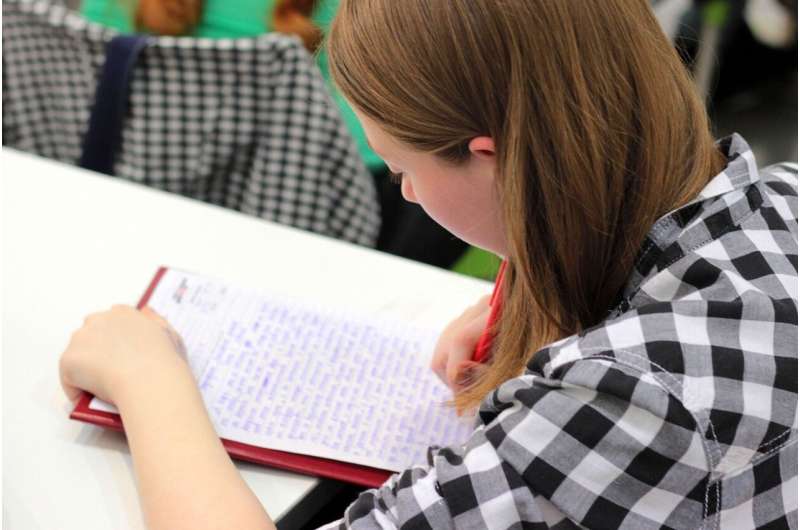This article has been reviewed according to Science X's editorial process and policies. Editors have highlighted the following attributes while ensuring the content's credibility:
fact-checked
trusted source
proofread
Study finds German students rank middle of the pack in creative thinking

The creative thinking ability of 15-year-olds in Germany corresponds to the OECD average. That is a further result of the latest PISA study. The analysis shows that creative thinking skills closely correlate to results in the core competencies in mathematics, reading and the natural sciences.
Can adolescents generate ideas to solve a problem? Are they capable of creating something new? Creative thinking is seen as an essential skill for dealing with change—in the working world and in our personal lives. Consequently, the most recent PISA study has for the first time assessed this capacity in students shortly before the end of compulsory education. Along with the test in mathematics, reading and the natural sciences (for which the results were published in 2023), around 5900 15-year-olds in Germany completed tasks in creative thinking.
For example, they were asked to come up with various ideas to raise public awareness of the importance of bees. In another task they had to think up a dialog for a comic strip.
"The study focuses on whether the young people are able to generate ideas, evaluate and improve on the ideas of others, and come up with several different ideas for a single question. It is about solving social and scientific problems and the ability of students to express themselves verbally and visually," explains Prof. Doris Lewalter of the Center for International Student Assessment (ZIB) at the Technical University of Munich (TUM), the head of the German part of the PISA study, which is coordinated by the Organization for Economic Cooperation and Development (OECD).
Germany ranks alongside France and Spain
The average skill level of the German 15-year-olds matches the OECD average. The highest results in the OECD states were achieved by 15-year-olds in South Korea, Canada, Australia and New Zealand. If all participating states are included, Singapore is at the top. Germany is on the same level as such countries as Spain, France, the Netherlands and Israel.
Based on the test scores, the study places the students in various proficiency levels. For 27% of students tested in Germany, the levels correspond to creative thinking skills that are strongly indicative of future success in the career world. Meanwhile, 22% were barely able to generate ideas for simple visual designs and written descriptions or find solutions to problems.
Strong link to core skills
Further analysis suggests possible reasons for these results. The strongest correlation identified by the team of researchers was with the core PISA skills of mathematics, reading and natural sciences.
"When students learn how to apply mathematical and scientific knowledge and understand texts, they obviously develop creative thinking skills as well," says Doris Lewalter. "We assume that the skills are mutually dependent."
The analysis also shows that girls significantly outperform boys in creative thinking. However, after controlling for the effect of girls' stronger reading skills, the gender gap in creative thinking ability is statistically quite small. The same holds with regard to differences between school types. The significantly better results at higher secondary schools (Gymnasium) are explained in particular through the stronger skills of these pupils in the three core areas.
'Openness to ideas promotes creative thinking'
"Creative thinking can be nurtured," says Prof. Lewalter. "But that is not to say that we should be teaching creativity as a subject in its own right. On the contrary, students need to be offered opportunities to think creatively in every subject and should be encouraged to do so.
"When teachers are open to different ideas and, instead of instantly labeling every answer as right or wrong, are willing to take up a seemingly misguided suggestion as a starting point for working together towards a solution, students will then see that their ideas are respected and at the same time will learn to think creatively."
More information: Study (in German): Kreatives Denken in Deutschland und im internationalen Vergleich
Provided by Technical University Munich





















